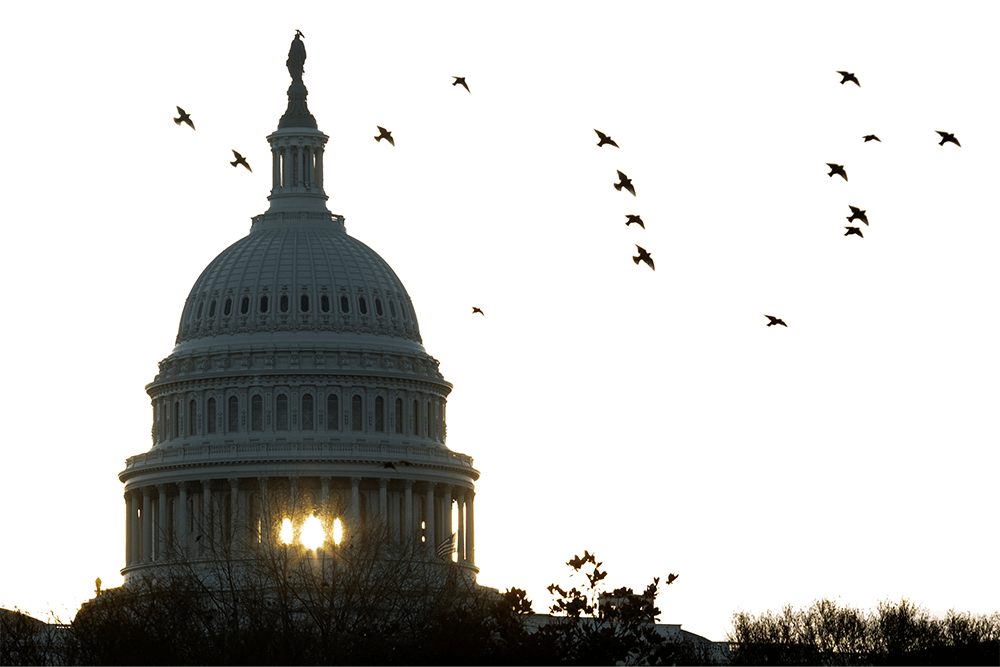
I am relieved: Despite threats of potential voter intimidation or even violence, this year’s midterm elections went remarkably smoothly and peacefully. This is thanks in no small part to the heroic efforts of many different groups of people, including lawyers, poll workers, election officials, and more than 700 poll chaplains who offered a moral presence at voting sites around the country. Though some votes are still being counted, most of the election deniers who lost their races last Tuesday are conceding their losses without stirring up conspiracy theories about voter fraud.
And I’m grateful: For me, the most encouraging result of the midterms is how voters rejected candidates who denied the results of the 2020 election. When I settle down to eat my fried turkey and sweet potatoes next week, I’ll be giving thanks for every person who cast their vote in defense of democracy and against election denialism, which was arguably the biggest loser in this year’s election results.
But while voting has ended, the need for sustained civic discipleship has not. After all, voting, while essential, is just the starting point when it comes to following the mission Jesus outlines in his initial sermon in Nazareth to “bring good news to the poor … and proclaim the year of the Lord’s favor” (Luke 4:18-19). Civic discipleship recognizes that in our democracy — imperfect as it may be — fulfilling Jesus’ call to bring God’s reign of justice, righteousness, and inclusive love closer to earth requires that we are actively and at times courageously engaged in our politics. The marriage of our civic participation with being followers of Jesus is rooted in the conviction that our deep civic engagement is because of our faith, not despite it.
To practice this kind of civic discipleship, we’ll need to summon a sense of steadfast resolve, for while election denialism seems to be waning, the dangers of election subversion and voter suppression aren’t over: More than 170 election deniers who were on the ballot for the House, Senate, and statewide races are projected to win their races and inject more of their poisonous rhetoric into our public life. Earlier this week, former President Donald Trump announced he is again running for president in 2024, a campaign that’s guaranteed to fan the flames of polarization and election denialism once more. In the next two years, we’ll need to keep working to recognize the image of God in each voter by ensuring everyone has a right to equal agency in determining the leaders who govern us.
We’ll also need to resist the urge to tune out between elections. This is admittedly hard, especially for those of us who are exhausted, cynical, and even disgusted by the tenor of our politics. “Social change is complex, and it takes time,” said Sojourners director of campaigns and mobilizing Sandy Ovalle Martínez last night in the second session of Power Week, a series of conversations about staying engaged in social change after an election. The key, she explained, is determining where you’re called to act — and then doing it. “Knowing your role in the ecosystem of change will help you not burn out,” she said. (The third and final part of that SojoAction series will take place tonight and you can register here; videos of each session will be sent to participants next week).
Think about where you’re called to take action: Maybe when you’re gathered around the Thanksgiving table next week, you lean into those necessary and sometimes hard conversations with fellow church members, family, or friends who’ve been swayed by lies about stolen elections or the false gospel of Christian nationalism. For pastors and church leaders who have been reticent to be truth-tellers about the assaults and danger facing our democracy, consider that now is the perfect time to share that message in the aftermath of a largely peaceful election.
Civic discipleship also requires building relationships with civic leaders and others in your community to hold them accountable to the values and priorities that matter most to you; post-election is the perfect time to start that process. To get started, you can join one of our SojoAction campaigns on a range of justice issues, learn how to set up a meeting with your elected representatives, or write a letter to the editor on an issue you are passionate about.
Between now and the end of the year will also be a critical time to push the outgoing Congress to act on important priorities like lifting the debt ceiling to ensure the government has funding to continue its vital services; pushing for a permanent expansion of the child tax credit like the one that lifted millions of children out of poverty before it expired last year; reforming the Electoral Count Act while advocating for deeper voting rights and election protections; and passing federal legislation that protects interracial and same-sex marriage (which the Senate voted to advance yesterday with bipartisan support).
In the aftermath of the midterms, it is necessary and appropriate to breathe more freely and to celebrate wins even as we recommit ourselves to the work ahead of accelerating the nation’s embrace of a just, inclusive, multiracial democracy.

